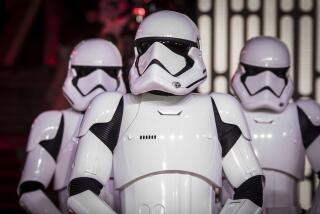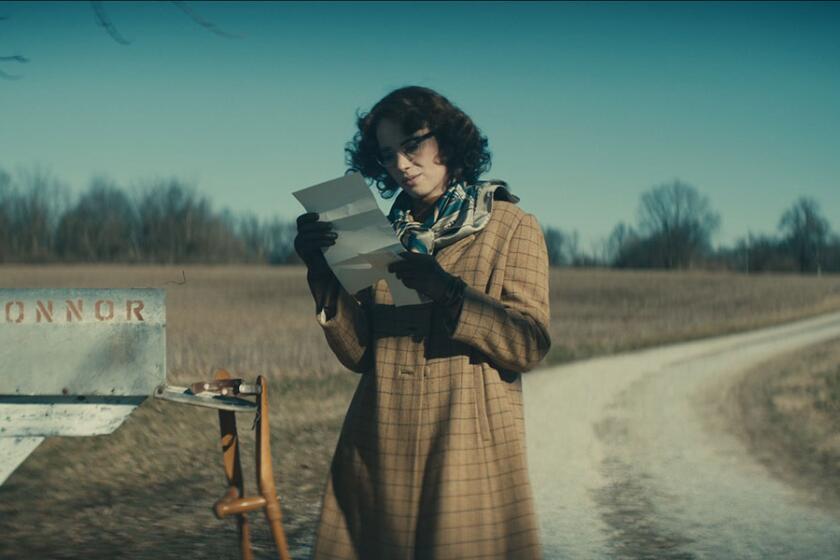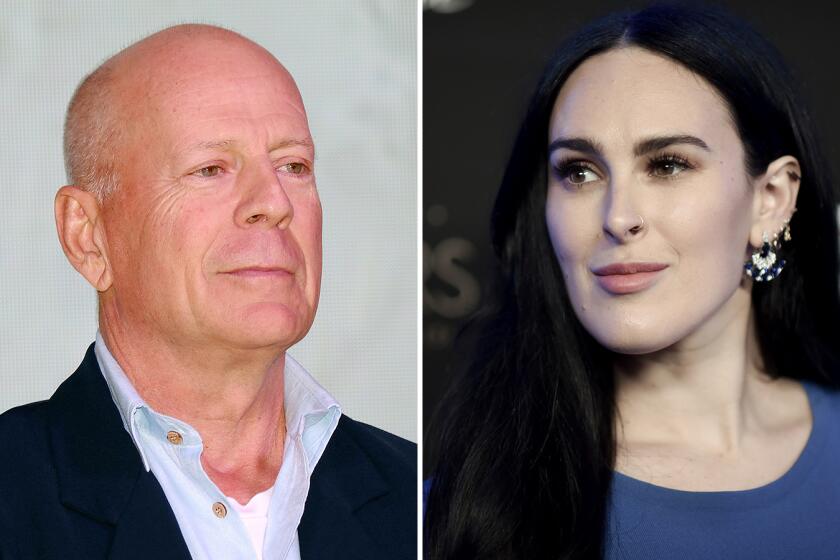Recent Israeli films are less political
In a popular Israeli joke, several men gather regularly to discuss the state of the world, a conversation that takes a turn toward the bleak. One day, one of the men surprises the others by announcing he’s become an optimist.
The others look at his furrowed brow and ask, “If you’re an optimist, why do you still look so concerned?” The man replies: “You think it’s easy being an optimist?”
In a country laced with worry, it’s perhaps no surprise that even success is cause for consternation. With Scandar Copti’s and Yaron Shani’s “Ajami,” Israel has just landed its third consecutive foreign-language Oscar nomination. That’s a feat few other countries -- including global cinema powerhouses like France and Spain -- have pulled off. (The last time came when Spain did it in the late 1990s.) But even as the filmmakers behind “Ajami” take their place at the Kodak Theatre next weekend, there’s a little bit of celebration back home -- and plenty of debate about what it all means.
A startlingly dramatic and touchingly human work from one Palestinian and one Israeli filmmaker, “Ajami” tells the story of warring Arab families in the working-class Israel port town of Jaffa, using multiple points of view and an intoxicating mix of genres. “Ajami” is a crime thriller, cultural biography and family drama all rolled into one, a film that manages to expose subtle layers of character while still weaving a tight narrative. (In this way, it’s much like another foreign-language Oscar nominee, Jacques Audiard’s “A Prophet”).
But more than the many things the movie is, perhaps more significant is what it isn’t: a topical film. Copti and Shani are preoccupied with human dynamics far more than political or social ones; if issues like military policy and economic inequality are present at all, it’s simply as part of the cinematic furniture.
That would be unremarkable in many places. But in the political-minded precincts of the Middle East, it reflects a substantial change.
Over the last several years, Israeli movies, which for so long have been set in political hotbeds or wars (there are a lot to choose from), have tied in with far less frequency to the morning papers and evening news.
Just two years ago, the Oscar nominee was “Beaufort,” a story of Israeli soldiers at an outpost before the start of the country’s conflict with Palestine in Gaza 2000. And even movies that told human stories had a political cast -- Eytan Fox’s 2006 romantic drama “The Bubble,” for instance, told a love story between a Palestinian and an Israeli and ended with a shocking terrorist explosion.
Recently, though, the biggest Israeli-produced hits (about a dozen films are made locally each year) are films you’d scarcely guess would come from the place. The two biggest of the last year are “A Matter of Size,” a story about an overweight man who takes up sumo wrestling to deal with his insecurity, and “Lost Islands,” a coming-of-age love triangle involving twins and set in the 1980s. Not exactly a gritty drama in the West Bank.
“If you see all the movies we’ve produced in the last two years, most of them aren’t dealing with the situation with the Arabs,” says Mosh Danon, the head of the country’s producer guild and a producer on “Ajami.” “They’re comedies and human dramas.”
Another producer on “Ajami,” Talia Kleinhendler, says that there’s value in the country producing films with more of a universal feel. “It’s important for a local cinema [culture] to tell a simple story that doesn’t have anything to do with politics. People here have regular lives and regular loves,” she says.
But in a country where filmmaking and politics (like everything else) have been so inextricable -- and where box office has so long been dominated by Hollywood hits -- not everyone is ready to embrace the shift.
“I really worry when people describe a movie and they say it’s like any love story, just set in Tel Aviv,” says Eran Riklis, the director of politically inflected international hits such as “The Lemon Tree” and “The Syrian Bride” and arguably the most acclaimed filmmaker working in Israel today. “There is a dangerous tendency in Israel to say there’s so much trouble, don’t worry, just worry about your family and your house and your jeep. And I do think in a country like Israel you have to be a socially conscious filmmaker.”
Riklis has an ally in the international film community, which continues to crave and endorse political films from the region. The Venice Film Festival this year gave its top Golden Lion prize to “ Lebanon,” Samuel Maoz’s brilliant and difficult story of a group of young tank operators during the Israeli war in Lebanon in the early 1980s.
But audiences felt differently: They didn’t come out to see the film and it proved to be a box office flop.
That’s why Katri Schory, the head of the Israel Film Fund, which doles out the money that will fund the development of the dozen or so films made (out of 150 scripts) each year, says he has some concern that the shift isn’t going far enough. “I would love to see some genre films,” Schory says.
The Israeli film business had been moribund until the country passed its so-called Cinema Law in 2001, allocating government funds to script development production.
Even that may not have been enough, but in 2002 an immigrant drama called “Late Marriage” came out and became a blockbuster, and the current Israeli New Wave was born.
But even with all the Oscar and international acclaim, money remains scarce, and the topsy-turvy nature of Israeli budgetary politics always has filmmakers on edge. “There’s always this catastrophic feeling of ‘Where it’s all coming from and will this be the last year?’ ” Riklis says, echoing the concerned sentiment of many Israeli filmmakers.
Some say broadening the genres is essential if the country is to go beyond government funds and take better advantage of co-production money and the lucrative remake market, a phenomenon that’s begun to happen. John Madden recently remade a dramatic thriller called “The Debt” starring Sam Worthington, and Harvey Weinstein has optioned “A Matter of Size” for an American remake, although, in a sign of the perils of dealing with U.S. film interests, a legal battle ensued that resulted in the producers winning back the rights.
That will probably mean fewer political films -- and convincing some filmmakers to soften their stance.
There are signs some will. Riklis’ next movie is titled “The Mission of the Human Resources Manager,” and it’s a dramatic comedy about a man who works for an industrial bakery, with few of the political concerns that informs his previous work. Was it difficult to move away from tensions between Jews and Arabs? “A little bit,” he says, then, after a pause, adds, “but it’s also kind of a relief, actually.”
steven.zeitchik@latimes .com
More to Read
Only good movies
Get the Indie Focus newsletter, Mark Olsen's weekly guide to the world of cinema.
You may occasionally receive promotional content from the Los Angeles Times.







